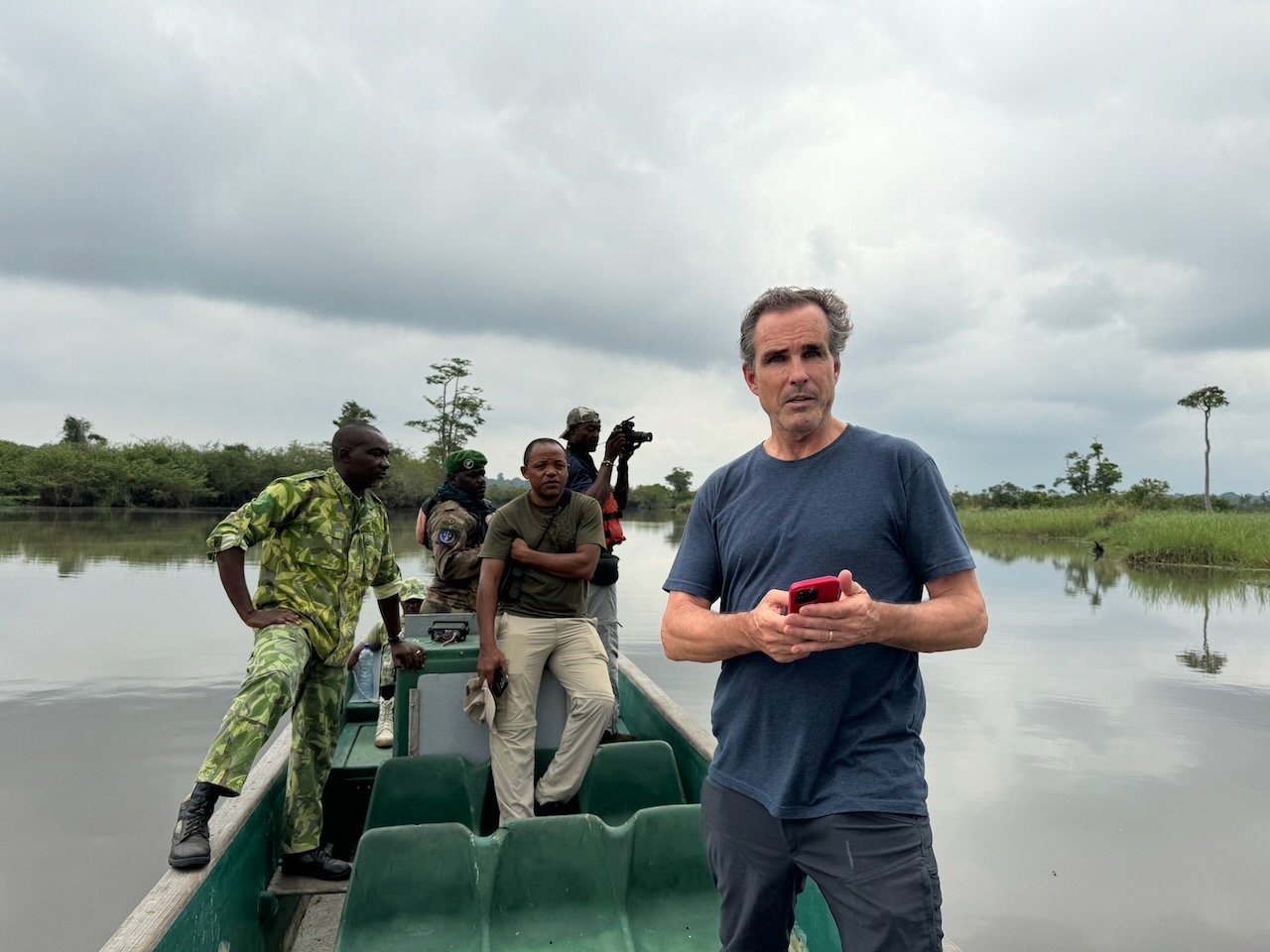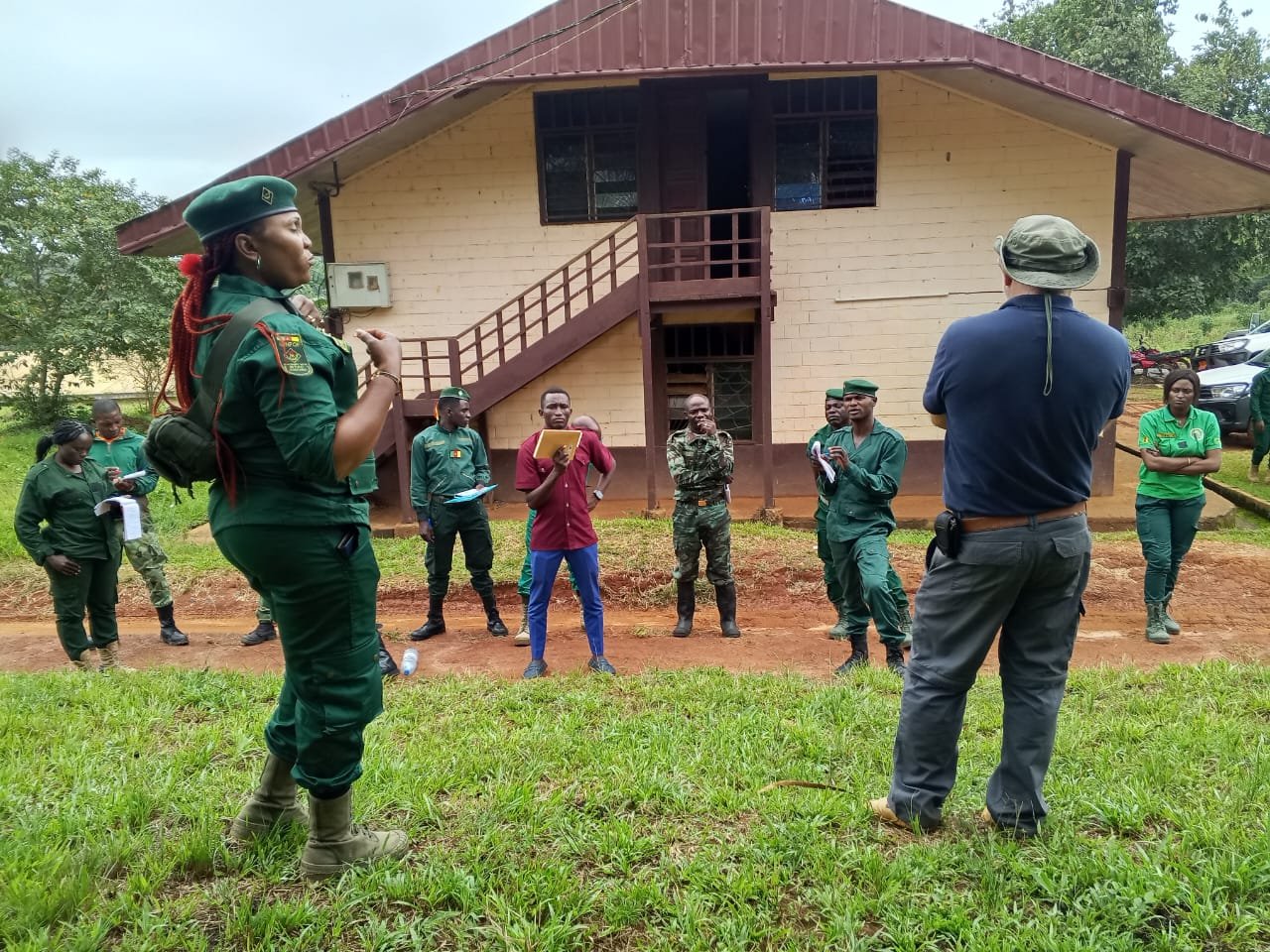GC Cameroon Progress: The Dja Rainforest Complex 2023-2024
INTRODUCTION
The MINFOF (Ministry of Forestry and Wildlife) officially created the Ngoyla Faunal Reserve in 2014 with the support of WWF. The reserve is located in the south-central part of the Ngoyla-Mintom massif. The climate of the reserve is tropical, with two wet and two dry seasons. The annual precipitation is 1,500 mm in the northern area and 2,000 mm in the southern area. The average annual temperature is 24–25 °C due to the elevation (500–600 meters) above the sea level.
Characteristic vegetation types are humid evergreen rainforests (82%), swamp forests (15%), natural forest clearances (2%), and secondary forest-farm bush mosaics (1%). Notable biodiversity includes 230 fish, 280 birds, and 37 large and medium-sized mammal species. Notable mammal species are the African forest elephant (Loxodonta cyclotis), western lowland gorilla (Gorilla gorilla gorilla), central chimpanzee (Pan troglodytes), mandrill (Mandrillus sphinx), leopard (Panthera pardus), African forest buffalo (Syncerus caffer nanus), western bongo (Tragelaphus eurycerus), sitatunga (Tragelaphus spekii), and forest duikers.
In addition to its high density and diversity of forest animals, the Ngoyla Faunal Reserve, situated within the TRIDOM complex, serves as an important corridor for migrating species like forest elephants, connecting the Dja Faunal Reserve, the Nki National Park, and the Minkébé National Park of Gabon. The richness of the area has led MINFOF to construct a camp named BASE VIE for his personnel.
Led by Oliver Fankem, Director of Central Africa for Global Conservation, three national parks in Cameroon covering over 1 million hectares of intact tropical forests now have continuous active patrolling and systems in place for managing 60+ rangers in Southeast Cameroon.
Supporting park and wildlife protection in Dja Faunal Reserve, Ngoryla and Nki National Parks, and two adjoining forest concessions of 1.2 million hectares, we are upgrading Park and Wildlife Protection systems, scaling Community Protection around the entire park’s southeast, and delivering training and equipment to provide real protection across a massive area of deep forests and jungles home to elephants, great apes, and many other endangered species.
Recent Ivory confiscations from Cameroon elephant poachers coming into Gabon killing Africa’s last African Forest Elephants.
In 2023–24, Global Conservation secured needed funding for active protection, enabling 12,000 kilometers of annual patrols, hundreds of interdictions, confiscations, and seizures, while greatly improving ranger and community Ecoguard morale.
This year, Global Conservation was awarded a major multi-year grant from UK DEFRA to reduce International Wildlife Trafficking (IWT) as well as a EU Natur grant for Park and Wildlife Protection in close collaboration with Forestry Concessions.
Covering an area of deep forests with poor roads and access for protection of forests and wildlife is challenging, especially in the rainy season. Most developing countries, such as Cameroon, have few resources for environmental protection and rely on logging and agro-industry for economic development, making national parks the last bastions for wildlife and rangers the front line in man's war on nature.
Dja Rainforest Complex combines 3 national parks and 6 forestry concessions to protect elephants, great apes, and intact ecosystems in Southeast Cameroon.
Without the constant presence and active patrolling of Park Rangers and Community Ecoguards, national parks will be rapidly cut and denuded and cleared of their last animals for sale of parts, ivory or meat consumption. Already, Cameroon has lost 95% of its African Forest Elephants, with less than 2,000 remaining, the last surviving in the deep intact forests where we work, along with the last great apes (gorillas, chimpanzees) and other key species.
By deploying Camera Trap networks across the landscape, GC has enabled:
Wildlife monitoring
The discovery of migration routes
The identification of priority areas to focus protection efforts
Over the past two years, GC has improved three national parks protection efforts:
Patrolled over 24,000 kilometers, mostly by foot on long-range vehicle patrols.
Hundreds of interdictions and confiscations of bushmeat, ammo cartridges, motorbikes, guns and chainsaws.
Newly restored the Lomie Command Center with internet, solar and generators including dormitories for 20 rangers.
Deployed 16 networks of 20-30 Trail Cameras in Dja-Nki-Ngoryla proving accurate biodiversity estimates and patrol targeting to reduce poaching.
With support from GC donors, the government, foundations, and families, Cameroon now has a strong protection model for all its protected areas, and our work will now be helping Gabon’s Minkebe National Park stop elephant poaching from Cameroon syndicates entering Gabon, where the last forest elephants are now trying to survive our War on Nature.
GC Cameroon has been working for the past three years to reinforce national park patrols in Southeast Cameroon across nearly one million hectares, supporting SMART patrolling, equipment, training, and community ecoguards to reduce illegal wildlife poaching, especially of Class A wildlife such as elephants, gorillas, chimpanzees, and pangolins.
By reinforcing constant patrolling and presence in and around each national park and working to support MINFOR Rangers and Community Ecoguards, professional poachers and game meat hunters are less interested in assaulting the national parks due to high penalties and confiscation of motorcycles and weapons, as well as the risk of jail time and fines, especially for Class A wildlife.
Over the next two years, we will be increasing patrol coverage across all three national parks using the SMART Patrolling system, as well as supporting planning, logistics, operations, and deployments.
GC rehabilitated the Lomie Command Center in the Eastern Sector with a new roof, dormitories, communications, solar electricity, and a dedicated building for the Park Conservator and GC Team to work in close collaboration.
Ngoyla Town is planning a new restored Command Center to support patrolling in both Ngoyla Faunal Reserve and Nki National Park, as well as expanding wildlife monitoring and protection with two large forest concessions covering nearly 1.2 million hectares.
Oliver Fankem was already a conservation leader in the Dja Rainforest Complex for nearly twenty years before joining Global Conservation in 2021 as Director of Central Africa. Oliver Fankem has published important scientific studies on elephants and great apes in the landscape, providing a solid baseline of biodiversity to compare progress after our 5- to 6-year Global Park Defense and Community Protection program.
In 2024, Global Conservation will be renovating the Nki National Park headquarters which has sat empty the past 10 years due to poor contractor management.
The number of forest elephants in Cameroon is below 2,000 countrywide and under 1,000 in our GC Project area for the protection of Dja-Nki-Ngoryla National Parks.
Cameroon’s Forestry Ministry has been impressive in its management of forests and focus on selective logging of key species, not clear cutting, enabling the rebound of forest and wildlife populations, many of whom survive outside the national parks in forestry concessions.
ABC News Bob Woodruff filming GC Projects in Cameroon and Gabon.
ABC News Visits Cameroon
Bob Woodruff and ABC News came with GC Executive Director Jeff Morgan to film the successes and challenges of protecting Cameroon’s last remaining tropical forests and wildlife habitats. ABC, Disney, and Hulu networks will release a four-part series on GC's work in September 2024.






























